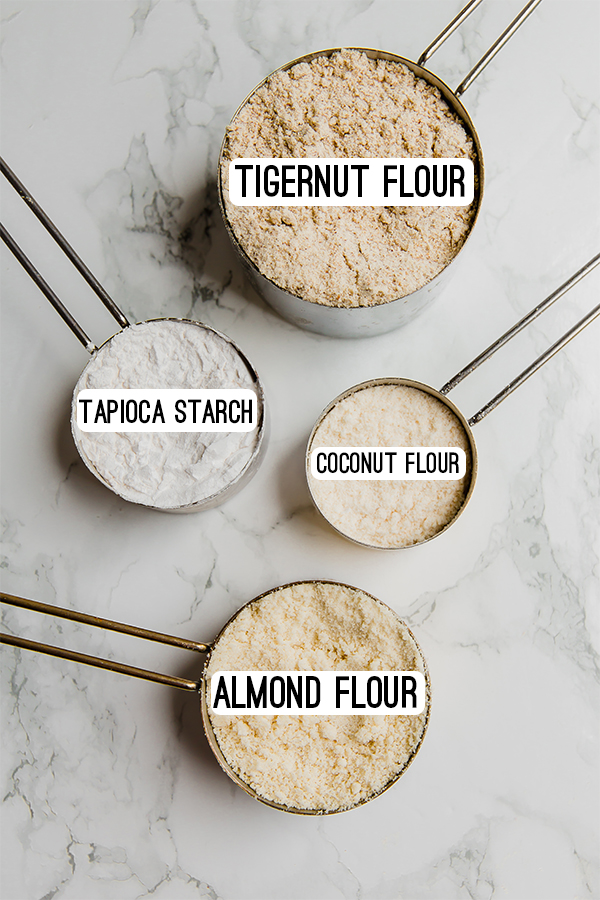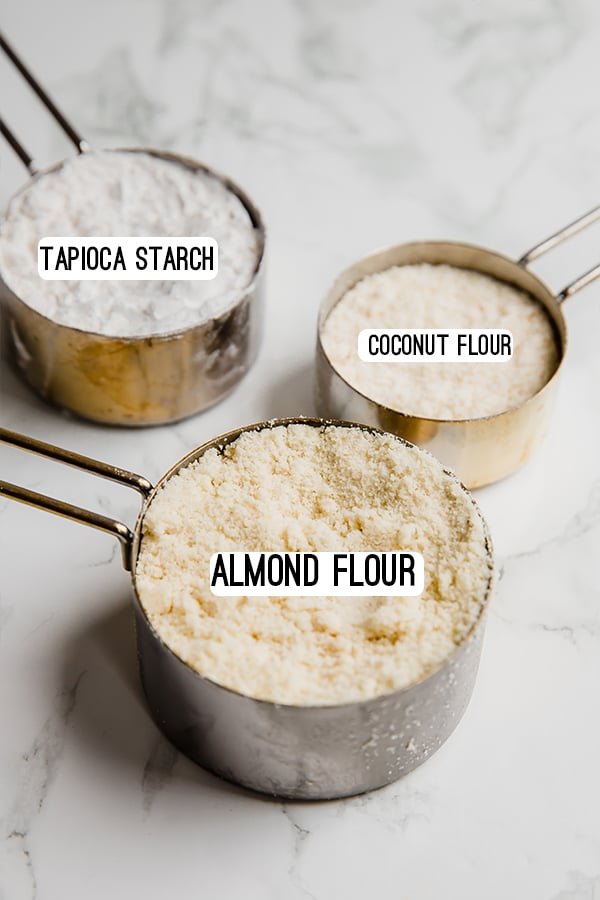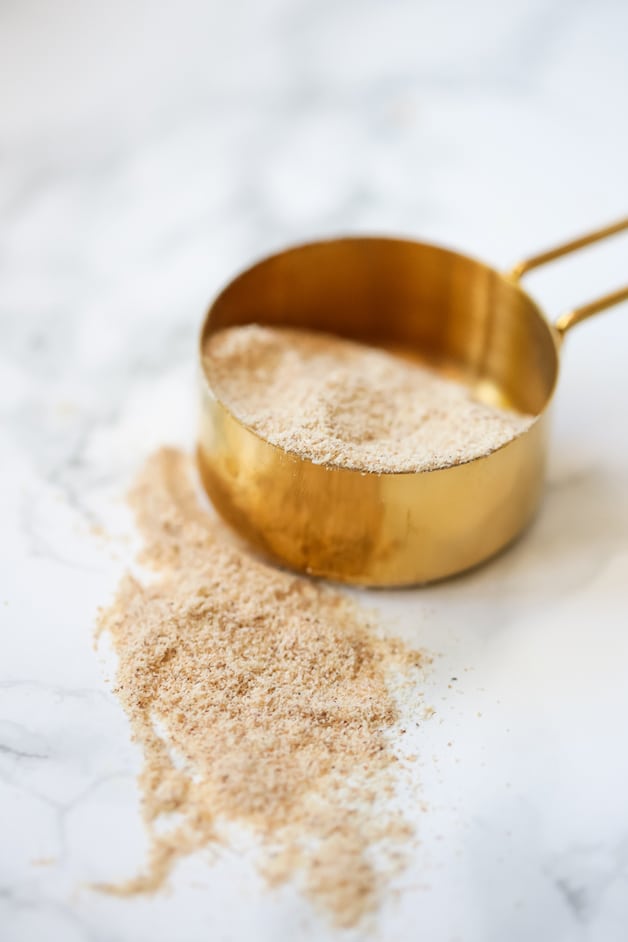Complete Guide to Grain Free Flours
This post contains affiliate links.
This complete guide to grain-free flours covers what you need to know about using, subbing, and buying these flours!

First, why use grain-free flours?
Though there can indeed be health benefits to consuming properly prepared grains for those who tolerate them, many with digestive issues find grains (especially in excess) to be an issue for them. Grain-free flours are a great alternative for those who follow grain-free diets like a paleo diet! Many grain-free flours (like coconut flour and almond flour) are also great lower-carb alternatives for low-carb and keto diets.
Though grain-free flours still don’t necessarily swap 1:1 or fully replace the same properties that something like a pastry flour would, they’re an amazing option to have, especially when used correctly!
I know first hand that all of the options can be confusing, which is why I’m sharing this blog post to help break down the different flours and their most common uses.
Where is the best spot to buy grain-free flours?
You can often find these flours at the following retailers…
- Whole Foods
- Natural Grocers
- Sprouts
- Amazon
- iHerb
- Thrive Market
Can you swap these flours 1:1 in recipes?
Probably the most common question that I get is “can I swap this flour for that one”, and 99% of the time, the answer is unfortunately “no”. The reason is that these flours have very different textures, characteristics, and serve a specific purpose in each recipe. This blog post helps to explain the purpose of each flour a bit more.
Complete Guide to Grain-Free Flours
Cassava Flour
Cassava flour is derived from the cassava or yuca root plant which is often used in Latin American cooking. Cassava is very starchy, and it makes great fries, it’s delicious when boiled and mashed, and it’s the perfect starchy grain-free flour.
This is the flour that comes closest to swapping 1:1 for all-purpose flour, though I would still be aware of the recipe as a whole and whether or not you’re swapping too many ingredients.
Characteristics:
- Starchy
- Slightly sweet in flavor
- Similar texture to all-purpose flour
What it’s perfect for…
- Making tortillas, pizza crusts, and other baked goods where you would use all-purpose flour
Reccomended brand: Ottos Cassava Flour
Tapioca Starch
Tapioca starch is also known as tapioca flour and is derived from cassava. It’s a very starchy flour that is slightly sweet in taste. It’s very similar to corn starch and is used in a lot of the same ways.
Characteristics
What it’s perfect for…
- Making things “stretchy”. It’s great for making things like this stromboli from Grazed and Enthused which has almost a cheesy pull.
- Thickening sauces or soups
- Acting as a binding flour in baked goods
Recommended Brand: Anthony’s Tapioca Starch
Arrowroot Starch
Like tapioca starch, arrowroot starch and flour are also interchangeable. Arrowroot is another starch flour that is extracted from the roots of the arrowroot plant.
Tapioca starch and arrowroot starch are really the only flours on this list that I would ever recommend swapping 1:1, and even then, it can depend on the recipe. It’s very similar to tapioca starch, though I would say the biggest difference is that I prefer it in savory recipes like sauce or soups. I find it to be less gummy than tapioca starch, though the overall uses are very similar.
Characteristics…
- Starchy
- Very powdery when raw
- “Stretchy” in baked goods
What it’s perfect for…
- Making things “stretchy”. It’s great for making things like this stromboli from Grazed and Enthused which has almost a cheesy pull.
- Thickening sauces or soups.
- Acting as a binding flour in baked goods
Recommended brand: Anthony’s Arrowroot Starch or Thrive Market Brand
Almond Flour
Almond flour is one of my personal favorites and is the only flour on this list that is actually nut-based. There are several varieties of almond flour, but
Characteristics…
- Low carb
- Buttery flavor
- Slightly nutty by neutral texture
What it’s perfect for…
- Low carb recipes
- Breading (like these chicken tenders)
- Grain-free baked goods with excess moisture like zucchini muffins, etc.
Recommended brand: Bobs Red Mill Almond Flour
Tigernut Flour
Despite its name, tigernut flour is actually nut-free. Tigernuts actually aren’t a nut, but a tuber! This flour is slowly becoming more popular and is one of my personal favorites to cook with. It’s similar to almond flour, only starchier.
Characteristics…
- Sweet
- Gritty/nutty texture
What it’s perfect for…
- Sweet recipes like cookies, muffins, etc.
Recommended brand: Organic Gemini Tigernut Flour
Coconut Flour
Coconut flour is made from dehydrating coconut meat and grinding it down into a flour. Although the word “nut” is present, it’s actually a nut-free flour! Botanically, coconut is fruit, and not a nut, which can potentially make it a great flour for those who are nut-free.
This is probably the trickiest flour to sub out in recipes, but it has a lot of purposes! Coconut flour is super absorbent, so it’s perfect for absorbing excess moisture like recipes with vegetables or lots of liquids.
Characteristics…
- Sweet
- Dry
- Absorbant
- Low starch
- High fiber
What it’s perfect for…
- Low carb recipes
- Breading (like these chicken nuggets)
- Grain-free baked goods with excess moisture like zucchini muffins, etc.
Recommended brand: Anthony’s Coconut Flour




Hi Michelle,
Thanks for sharing this! I’ve followed you for a while now and really like many of your recipes but recently found out I’m allergic to coconut. Since you mentioned that coconut is one of the hardest to replace, do you have any suggestions for me?thank you in advance!
Sorry to hear that! it depends on the recipe!! If you comment on a specific recipe we can try to get back to you with the best possible swap
Do you have a recommendation for a all grain free mix that would be used for baking cookies? A combination of cassava, tigernut, tapioca, how much of each per cup?
Check out the mixes from Legit Bread Co! They carry a cookie mix that is my recipe, and other great mixes!
Thank you for this! We are celiac and need to go grain free. I’m starting to back everything from scratch with grain free flours, but not using almond flour! It’s so hard. I’m in the midst of trying to find a recipe for a grain free, GF vegan English muffin, any advice anyone?
I haven’t come accross one.. sorry!
Otto’s has an English muffin recipe. They are easy and pretty damn good, Nooks and crannies!!
Do you have a gluten-free, nut-free flour mix recipe that you can share with me?
Legit bread!
How can I print out your grain free flour guide? There is not print option. This is the best information I have seen on alternative flours. Thank you!
So glad it’s helpful!! Currently, there’s only an option to print recipes on my website since that’s mostly what i share and not whole blog posts like this one, but you can likely copy/paste and print from a word doc 🙂
Excellent article with such valuable information as to when to use each flour. Thank you! I have all of these flours in glass containers in my second freezer. I appreciate all you do for the AIP and Post- AIP community. Oh and your baby is off the scale cute!!!!
Awesome explanations! Thank you!
Thank you for posting this! Great info…clear, concise, and so helpful!!
Great article. I’ve had a few “new creations” after substituting different flours in a recipe and thinking it would yield the same result . Not all all flours make great cookies…Now I know the characteristics of each, I’m better able to know what to use for a recipe. Thanks.
So glad it was helpful!! Thank you so much 🙂
What’s your favorite “all-purpose” flour combination of these?